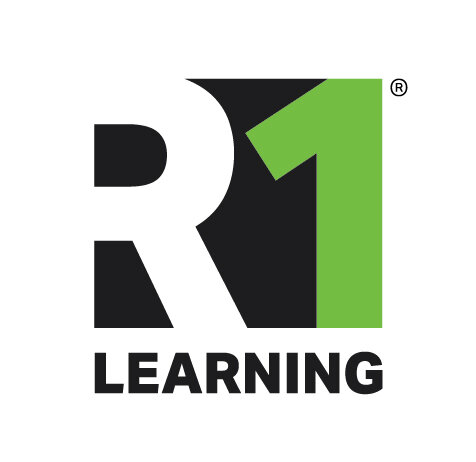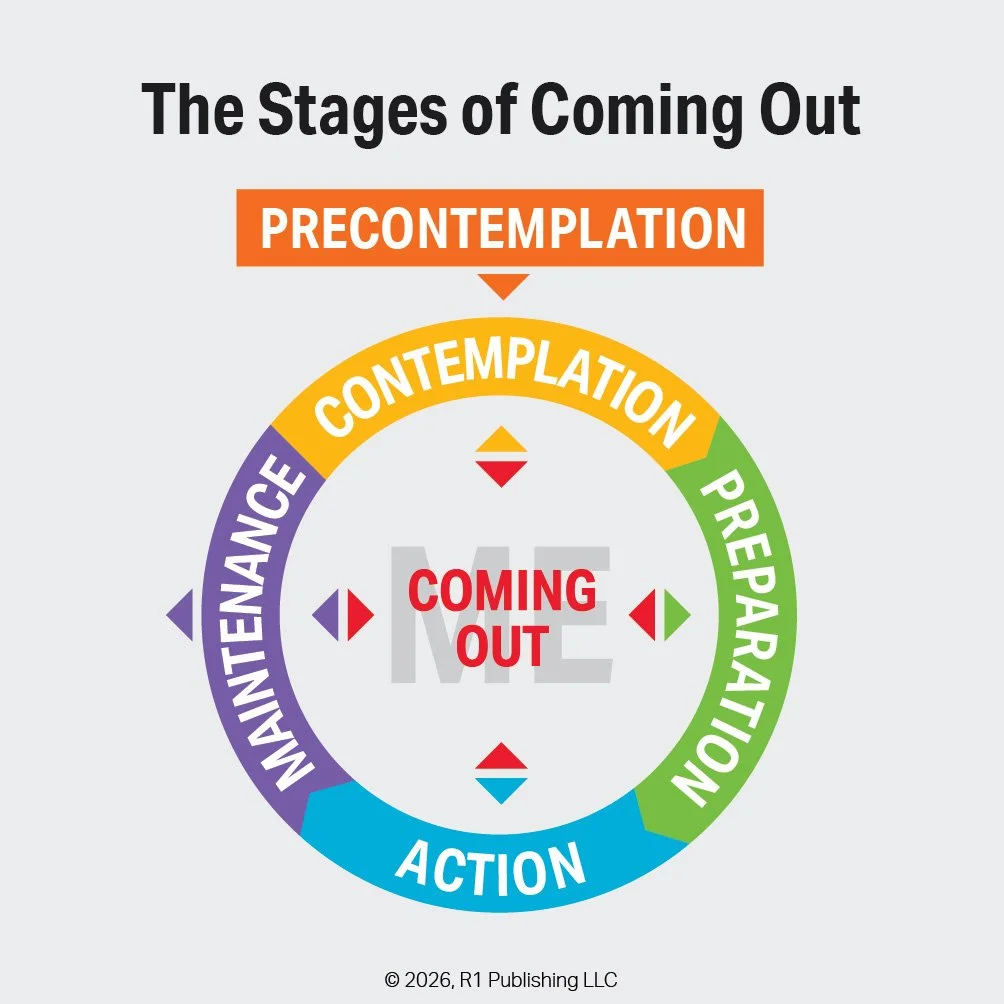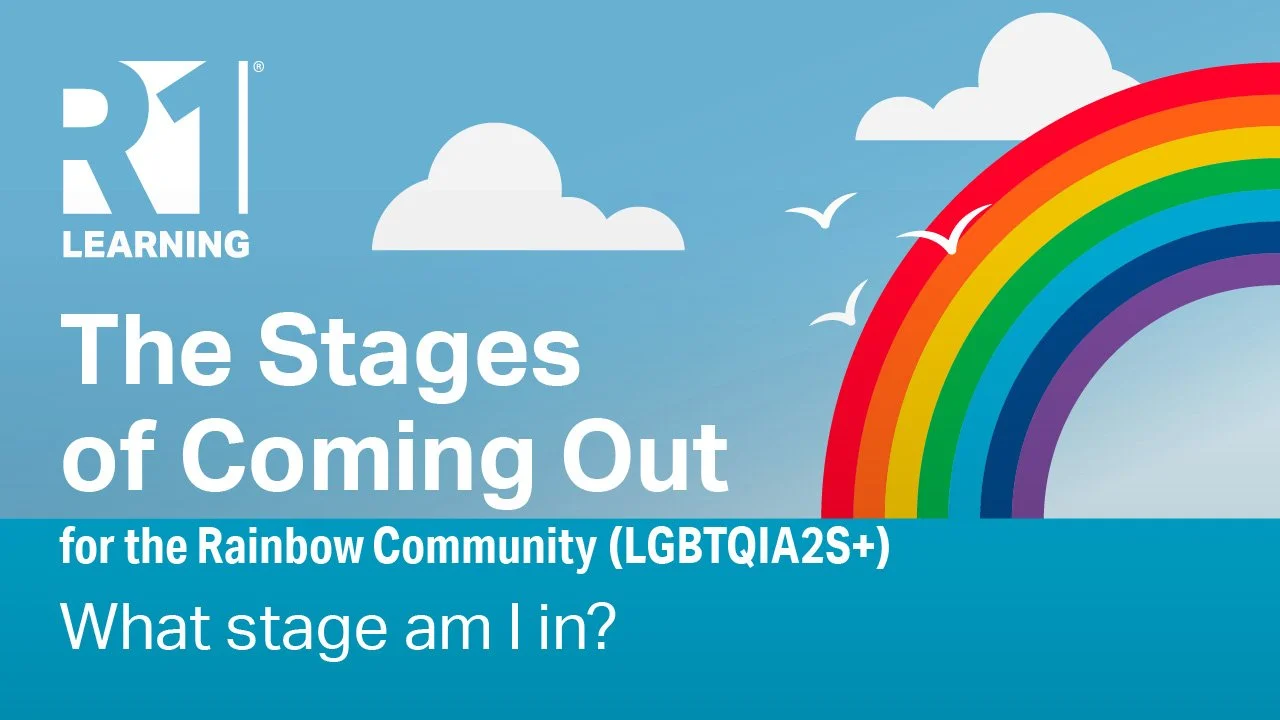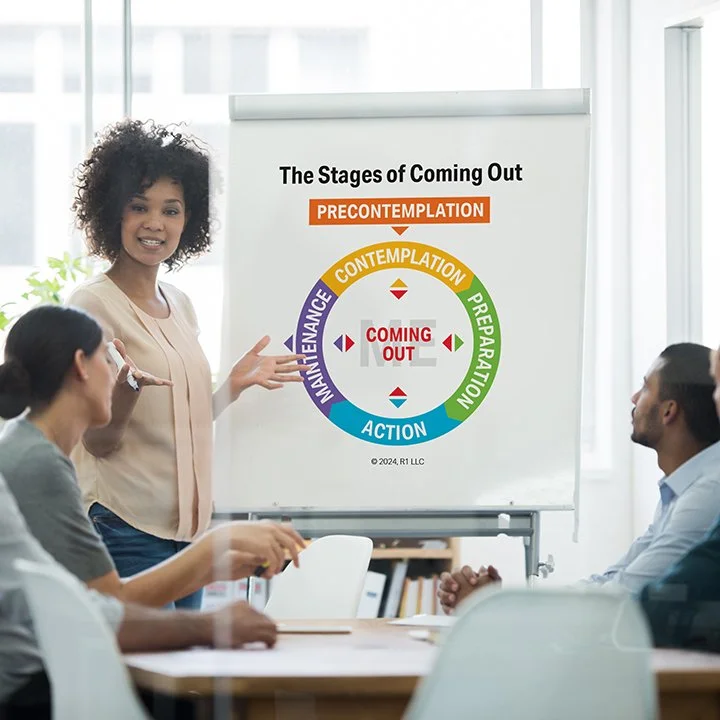The Stages of Coming Out — How Do I Apply the Stages of Change Model to the Rainbow Community? (LGBTQIA2S+)
Educating, Breaking Stigma, and Changing Lives
As the R1 journey progresses, we continue to see opportunities for equipping practitioners with evidence-based tools and curriculum resources that address relevant mental health challenges in their communities. We’ve had the opportunity to meet and work with several thought leaders along our path. One such individual we’ve been following for the past several years is Kristina Padilla who has been breaking stigma and educating communities nationally on the challenges facing individuals in the rainbow community. This post highlights how she’s adapted the work of Drs. James Prochaska and Carlo DiClemente, and their leading behavioral health model, the Stages of Change. Kristina has done a masterful job adapting this model to address the challenges affecting the Rainbow Community (LGBTQIA2S+). The purpose of this post is to highlight how to take the Stages of Change model, originally developed for smoking cessation, and apply it to the coming out process for individuals in the Rainbow Community.
Change — the act or process of transforming, shifting, or becoming different in nature
The Change Process. Change can be both exciting and difficult in any behavioral health context. The challenges associated with the coming out process for those in the Rainbow Community may be barriers to health and wellness given social norms, stigma, lack of education, and lack of compassion. During adolescence or at any stage of life, the journey of change towards becoming one’s true self requires education, resources, and a network of support.
We have chosen the leading behavioral health change model, the Stages of Change, developed by Drs. Proshaska and DiClemente, to help individuals explore where they are in their own change process. We’ve worked with Kristina Padilla to adapt this model to help individuals explore their thoughts, emotions, behavior, and choices related to their sex and gender identity. Additional background and details on the Stages of Change and the Transtheoretical Model (TTM) can be found in my earlier posts:
The 5 Stages of Change and the Transtheoretical Model (TTM) — Do I Know the Basics?
10 Processes of Change — Do I Know What Drives the 5 Stages?
We welcome your thoughts, perspective, and feedback regarding this application as it relates to your work and experience. Please send your comments to R1Team@R1Learning.com. We look forward to hearing from you.
A Context for Change — Sex and Gender Terms Defined
As a starting point, we want to help practitioners and individuals learn the basic vocabulary in new topic areas. Below we’ve defined the four (4) fundamental self-identity terms regarding one’s sex, sexual orientation, gender identity, and gender expression. These are areas where individuals are in the process of transforming, shifting, or becoming different in nature along life’s path. These cards represent areas for self-reflection and self-identification as individuals explore and learn about them given personal needs, situations, and circumstances. Being in conflict with one’s self-identity, values, character traits, physical traits, and aspirations can lead to stress, fear, anxiety, depression, and other mental health conditions. Behaviors such as hiding, concealing, and avoiding, become unhelpful tools overtime. Defense mechanism designed to help protect one’s core self from stressors and emotional dysregulation such as denial, compartmentalization, and repression get activated. Being true to oneself and becoming the person, one is and wants to be, is a healthy and meaningful endeavor. We hope these tools provides a set of resources to help you explore this journey with others in the communities you serve.
Explore R1 Discover — Interactive Engagement Tools
The Stages of Coming Out Defined
The Stages of Change adapted by Kristina Padilla. Change is as a process that unfolds over time, involving progress through a series of stages. According to the ground-breaking research of Drs. Prochaska and DiClemente, individuals move through a series of five stages — precontemplation, contemplation, preparation, action, and maintenance — in the adoption of healthy behaviors or the cessation of unhealthy ones. These stages are defined below. While progression through the stages of change can occur in a linear fashion, a nonlinear progression is common.
The 5 Stages of Change are listed below. For each, you will find a brief definition, examples of the Discovery Card’s behavioral statements, and Questions to Explore. Please note that all of this information, and more, is listed in the The Stages of Coming Out Topic Kit (which includes 1 Discovery Cards deck and 1 Facilitator Guide) located on the R1 Store.
Individuals in the Precontemplation Stage do not intend to quit concealment or hiding and start more healthy behavior in the near future (within 6 months) and may be unaware of the need to change. They typically underestimate the pros of changing (coming out), overestimate the cons, and are often not aware of this mindset. Individuals in this stage need to be more mindful of their decision-making and more conscious of the multiple benefits of changing their current behavior. Discovery Cards examples include:
I don’t think I could come out even if I wanted to
Coming out is not something I want to do right now
There is nothing I really need to change about hiding and concealing who I am
Why should I come out? It is only going to stress me and others
Individuals in the Contemplation Stage intend to quit and start more healthy behavior within the next 6 months. While they are usually now more aware of the pros of changing, their cons are about equal to their pros. This ambivalence about changing (coming out) can cause them to keep putting off taking action. Individuals in this stage learn about the benefits of change and the kind of person they could be if they quit and changed their behavior to more healthy ways. Discovery Cards examples include:
I am starting to see the benefits of coming out
I think I will be healthier and happier if I come out
I want to come out but not right now
I see how concealing who I am impacts me (e.g., hiding, faking, masking, pretending)
Individuals in the Preparation Stage are ready to start taking action within the next 30 days. They take small steps that they believe can help them quit and make the healthy behavior a part of their lives. It is helpful for individuals in this stage to seek support from friends they trust, tell people about their plan to change, and think about how they would feel if they behaved in a healthier way. Their number one concern is: When they act, will they fail? They learn that the better prepared they are, the more likely they are to keep progressing. Discovery Cards examples include:
I’m planning ways on how and when to come out
I am seeking help and resources to guide me on coming out
I am ready to set a coming out date
I believe that others will support me to come out
Individuals in the Action Stage have changed their behavior within the last 6 months and need to work hard to keep progressing in recovery. Individuals in this stage need to learn how to strengthen their commitments to change and to fight urges to slip back that may cause them to return to past behavior. They progress by learning to substitute activities related to the unhealthy behavior with positive ones, rewarding themselves for taking steps toward changing, and avoiding people, places, things, and situations that tempt them to behave in unhealthy ways. Discovery Cards examples include:
I am connecting with others and building a network of LGBTQIA2S+ friends
I am taking actions to come out and revising my plans as necessary
I am avoiding people that do not support me in coming out
I am building new healthy routines to support my coming out (e.g., joining LGBTQIA2S+ community, dating, expressing)
Individuals in the Maintenance Stage have changed their behavior for more than 6 months. It is important for people in this stage to be aware of situations that may tempt them to slip back into doing the unhealthy behavior — particularly stressful situations. Individuals in this stage are best served when they seek support from and talk with people whom they trust, spend time with people who behave in healthy ways, and remember to engage in healthy activities to cope with stress instead of relying on unhealthy behavior. Discovery Cards examples include:
I have accepted who I am and live fully as my true self
I love my life and act daily to keep it
I am serving and supporting others who want to come out
I protect my choice to be who I am
Copyright 2025 R1 Publishing LLC / All Rights Reserved. Use of this article for any purpose is prohibited without permission.
Questions to Explore
Answer these questions for yourself or someone you are working with.
What do you find helpful about this adaption of the Stages of Change model for addressing the needs of individuals struggling with their self identity regarding sex and gender?
Do the stages make sense to you? Are the categories helpful and easy to understand?
Which Discovery Cards behaviors resonate mostly with you as you read the examples?
As you look back over relevant counseling / coaching experiences, do you see how individuals move through the stages?
Do you see how individuals get stuck in certain stages? What keeps them stuck? How can you help them keep progressing through the stages?
How can you incorporate Motivational Interviewing (MI) techniques with the Stages of Change model and behaviors? What questions can you ask for each of the Discovery Card examples above when these behaviors show up?
How can you incorporate these ideas into your next one-on-one or group session?
Kristina Padilla — Thought Leadership
Kristina Padilla is world-renowned as a national speaker, author, educator, and advisor, advocating the principle of “living out loud.” They foster safer environments nationwide by conducting LGBTQIA2S+ educational talks and training sessions globally. Mx. Padilla has a Bachelor’s Degree in Criminal Justice Administration, and a Master’s Degree in Counseling
Psychology with an emphasis in Marriage and Family Therapy. They are a Licensed Advanced Alcohol and Drug Abuse Counselor (LAADC) and graduated from the Clinton Global Initiative University (CGIU) in 2023. Mx. Padilla is a Doctoral student working toward a Ph.D. in Psychology, specializing in the Psychology of Gender & Sexual Fluidity. Mx. Padilla is on multiple Diversity, Equity, Inclusion, Peer Support, and LGBTQIA2+ boards nationwide and profoundly impacts providing Training, Advocacy, and Education to all professionals. Mx. Padilla obtained their “Higher Education Teaching Certificate ‘’ at Harvard, The Derek Bok Center for Teaching and Learning in July 2020, and their Women Leadership Program (WLP) Certificate from Yale University School of Management in 2022. Mx. Padilla owns two businesses, www.RainbowGlobalCollective.com and www.NativeAmerican2spiritSacredCircle.com, which provide consulting and training worldwide. Kristina is a parent of a beautiful girl named Karisma. They are Indigenous, Western Apache, Cherokee, Aztec, 2Spirit-Transgender, Gender-Fluid, non-binary, same-gender-loving person. Kristina’s pronouns are They/Them & Ze/Zir, and they go by the prefix Mx. Padilla.
Facilitate Engaging Group Activities
Stages of Change Discovery Cards and Group Kits – Engagement Tools
Integrating these tools into your groups will allow individuals to build their own vocabulary, think about these concepts concretely, and put their choices into action. Visit the R1 Store to learn more about these evidence-based behavioral topics and models. The cards are an amazing tool for exploring these topics with individuals or groups.
References
Bandura A. “Self-Efficacy Mechanism in Human Agency.” American Psychologist 37:122–147, 1982.
Bandura A. “Self-Efficacy: Toward a Unifying Theory of Behavioral Change.” Psychological Review 84:191–215, 1977.
DiClemente CC. Addiction and Change. New York, Guilford Press, 2018.
Janis IL, Mann L. Decision Making: A Psychological Analysis of Conflict, Choice, and Commitment. New York, Free Press, 1977.
Prochaska JO, Prochaska JM. Changing to Thrive. Center City, MN, Hazelden Publishing, 2016.
Prochaska JO, DiClemente CC, Norcross JC. “In Search of How People Change: Applications to the Addictive Behaviors.” American Psychologist 47:1102–1114, 1992.
Prochaska JO, DiClemente CC. “Stages and Processes of Self Change of Smoking: Toward an Integrative Model of Change.” Journal of Consulting and Clinical Psychology 51:390–395, 1983.
Velasquez MM, Maurer G, Crouch C, DiClemente CC. Group Treatment for Substance Abuse: A Stages-of-Change Therapy Manual. New York, Guilford Press, 2001.
Here are a few ideas to help you learn more about R1 and engage others on this topic:
Share this blog post with others. (Thank you!)
Start a conversation with your team. Bring this information to your next team meeting or share it with your supervisor. Change starts in conversations. Good luck! Let us know how it goes.
Visit www.R1LEARNING.com to learn more about R1, the Discovery Cards, and how we’re creating engaging learning experiences through self-discovery.
























